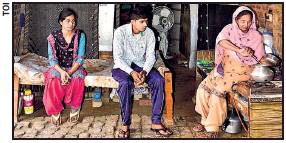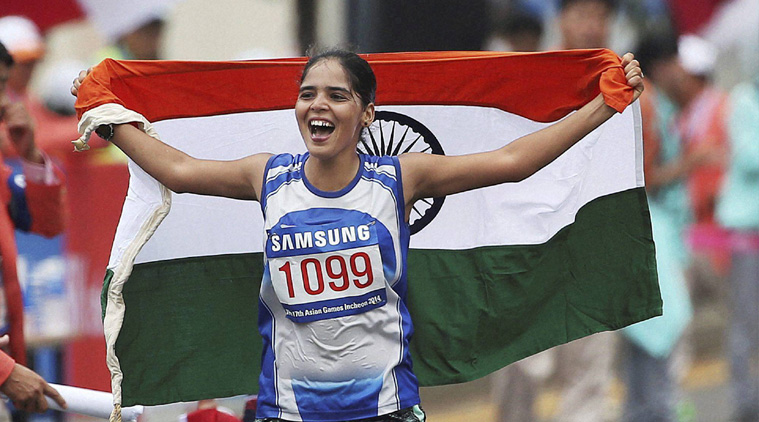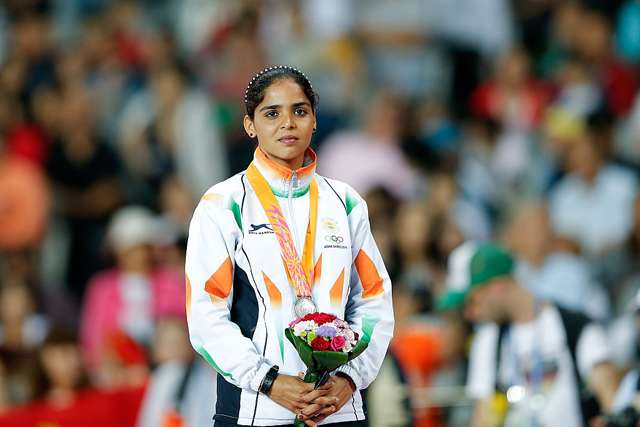Khushbir Kaur
This is a collection of articles archived for the excellence of their content. |
Early life

From: Yudhvir Rana, Such a long walk: From living in cowshed to Asiad medallist, August 11, 2018: The Times of India
Khushbir Kaur’s family still remembers the days when a cowshed was their home and the country’s top racewalker, who won a silver at the 2014 Asian Games, used to sleep on a creaky charpoy.
Due to abject poverty, the family would regularly skip meals once or twice a day. From a cowshed, they moved to a crumbling house with a leaky log roof. When it rained, they had to accommodate their cows inside the house.
Those hardships are fresh in the minds of 25-year-old Khushbir, now a DSP with Punjab Police, and her mother Jasbir Kaur, residents of Rasulpur Kalan village in Amristar. “It has been quite a tough journey,” Khushbir tells TOI from Bengaluru, where she is attending a national camp for the upcoming Asian Games.
‘We lived stashed with cows in a room’
Khushbir lost her father, Balkar Singh, when she was six. It was her ironwilled mother, who raised four daughters and a son by sewing clothes and selling milk in nearby villages.
“During the rainy season, my daughters, son, the cows and I all lived in a single room, stashed together,” Khushbir’s mother Jasbir Kaur says, tears rolling down her eyes. “Hun kisay nu vee pind vicho pucho ki DSP Khushbir day ghar jana hai tae saray tuhanu das daen gay (Now ask anyone in the village that you have to go to DSP Khushbir’s house, all of them will tell you where to go),” she adds proudly.
Jasbir was the family’s sole breadwinner after her husband’s death. Khushbir, however, has taken over the mantle of being the leader of the family after she started winning medals on the national and international stage. Her mother isn’t complaining. “It was only after Khushbir started winning medals and awards that we could afford a good meal. And after she won silver in the 20km race walk event at the 2014 Asian Games, we got a cemented roof over our heads,” says Jasbir.
Khushbir’s two sisters – Harjit Kaur and Karamjit Kaur – are also into sports. The third – Dharamjit Kaur – is a sports enthusiast. Her brother Bikramjit Singh wants to join the Indian Army.
Recalling their days of hardship, Jasbir says, “My husband was an employee with the state electricity department. But after his death, my in-laws’ family left me to survive with five young children – all on my own. But I didn’t lose heart, I dedicated my life to raise my children and encouraged my daughters to study as well as be involved in sports.
“We had a couple of cows. I used to sell milk and then stitch clothes, but the income was not enough. The teachers at the school where Khushbir and her sisters studied would often help them — with studies as well as school fees.”
Khushbir’s mother still has a couple of cows but the decaying, crumbling house has now turned into a modern pucca house. Signs of prosperity are visible. “My daughters are my pride. My message to anyone who indulges in female infanticide is: Remember, the girls saved the nation’s pride in the last Olympics,” she says.
Talking about difficult times, Bikramjit says, “I couldn’t invite my friends to our home because it was just a single room; and then we had cow dungs stored in that. It was awkward.”
2012-16
August 1, 2018: The Indian Express

From: August 1, 2018: The Indian Express
Khushbir shifted base to Khalsa College for Women in Amritsar, where she trained under coach Baldev Singh, a former Asian Championship medallist.
Khushbir Kaur couldn’t even afford to buy her shoes but continued to train barefoot as her determination to succeed pushed her to go further, Her hard work started paying dividends when she kept winning medals in the Junior race walking championships. Khushbir shifted base to Khalsa College for Women in Amritsar, where she trained under coach Baldev Singh, a former Asian Championship medallist. Her potential was first noticed at the Incheon Asian Games, two years ago, when she won silver medal with a timing of 1:33:07. The 23-year-old Khusbir has been setting the record books with her name right from a very young age.
After winning bronze in the 10,000 metre walk race at the 2012 Asian Junior Athletics Championships held at Colombo, Sri Lanka, she also went on to participate in the World Championships back in 2013 in the 20 km walk category. She is currently the 20 km walk record holder in the women’s category. She should capitalise on the big opportunity at Rio 2016 Olympics under the guidance of her coach Alexander.
Event - Women’s 20km walk
Event Date - August 19
Record - Personal best of One hour 33 minutes and 37 seconds in the 20km race walk.
Career Highlights – She won bronze in the 10,000-metre (6.2 mi) walk race at the 2012 Asian Junior Athletics Championships
2018, Rio Olympics: Khushbir Kaur to compete in the 20km walk
Anindita Ghosh, August 18, 2016: The Times of India

From: Anindita Ghosh, August 18, 2016: The Times of India
Khushbir Kaur came into the limelight when she grabbed the silver medal in racewalking at the Incheon Asian Games, two years ago, with a timing of 1:33:07. It was no mean feat for the small-town girl from Rasulpur Kalan in Punjab who used to run barefoot because she could not afford shoes. Kaur is the current national record holder in the 20 km walk, a record she created at Incheon. Racewalking is an Olympic discipline where one foot has to be in contact with the ground at all times. This event is usually held on roads or running tracks. In the Rio Olympics, Kaur will be competing in the 20 km walk for women on the 19th.
Supported by the Anglian Medal-Hunt Company, Kaur won a number of laurels in the junior race walking championships before her Incheon glory. She trained under Baldev Singh, a former Asian Championship medallist. She won a bronze in the 10,000 metre walk at the 2012 Asian Junior Athletics Championships in Colombo, Sri Lanka, and participated in the World Championships in 2013 in the 20 km walk category. In 2013 she bettered her personal best in the women’s 20 km walk in the Moscow World Championship with a time of 1:34:28.